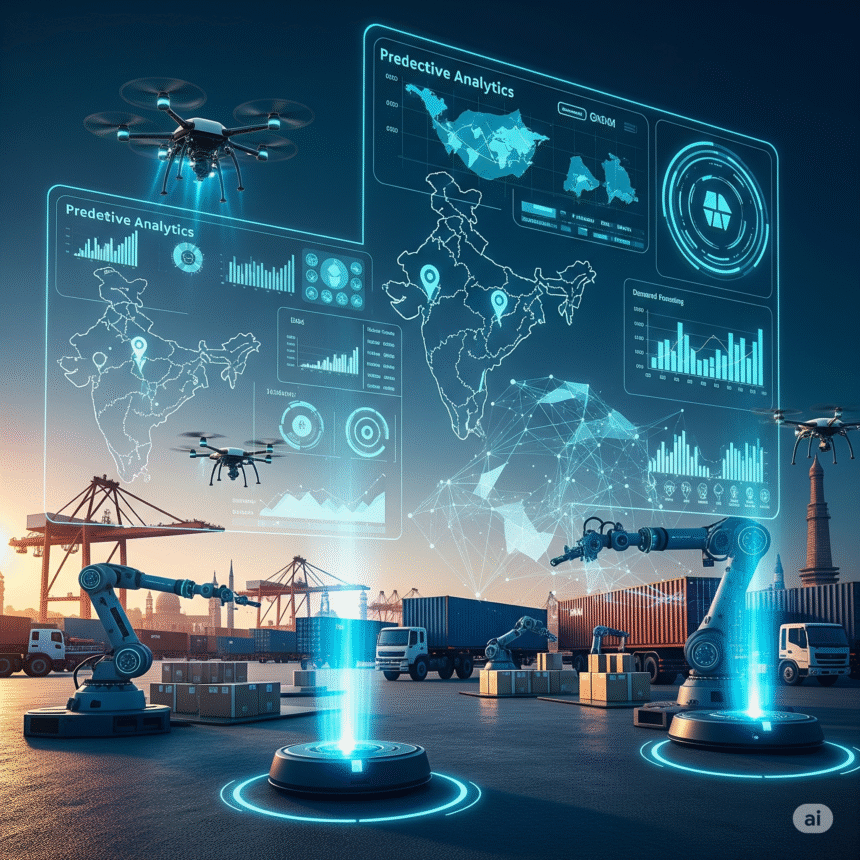India, with its vast geography and diverse economy, has always faced challenges in managing supply chains efficiently. However, the integration of Artificial Intelligence (AI) into supply chain management is changing the game. AI is enhancing visibility, reducing operational costs, and improving decision-making for businesses, making supply chains more agile and resilient. From inventory management to last-mile delivery, AI is playing a pivotal role in revolutionizing logistics in India.
AI-Powered Forecasting: Enhancing Efficiency
One of the biggest hurdles in supply chain management is predicting demand accurately. AI-driven forecasting tools analyze historical data, market trends, and external factors like weather to generate accurate demand predictions, enabling better planning and reduced wastage.
Recent Developments:
- BigBasket, India’s leading online grocery platform, uses AI to forecast demand and optimize inventory. This has reduced overstocking and wastage, particularly for perishable items, while ensuring product availability for customers.
- Flipkart leverages machine learning to predict surges during festive sales, ensuring warehouses are adequately stocked and deliveries are seamless.
Inventory Optimization: Striking the Right Balance
AI is helping businesses maintain the delicate balance between overstocking and understocking. By analyzing real-time data, AI systems provide insights on inventory levels, reorder points, and supplier performance.
Example:
- Reliance Retail has implemented AI-based inventory management systems that monitor stock levels in real time across thousands of stores. These systems automate replenishment processes, ensuring shelves are never empty while minimizing excess stock.
Smart Warehousing: Automating Operations
Warehousing, a critical component of the supply chain, is being transformed with AI-driven automation. Smart warehouses now employ AI to optimize space utilization, track goods, and streamline order picking.
Key Initiatives:
- Amazon India operates fulfillment centers equipped with AI-powered robots that sort, pack, and move goods efficiently. This has significantly reduced order processing times and enhanced accuracy.
- Delhivery, one of India’s leading logistics companies, uses AI to optimize warehouse layouts, reducing turnaround times and improving delivery speed.
Real-Time Visibility and Tracking
AI is enabling end-to-end visibility across supply chains, allowing businesses to track shipments in real time and predict potential delays. This transparency enhances customer satisfaction and helps companies respond proactively to disruptions.
Highlight:
- DHL India has adopted AI-powered IoT devices to monitor shipment conditions, such as temperature and humidity, ensuring the safe delivery of sensitive goods like pharmaceuticals.
- Ecom Express uses AI algorithms to predict potential delivery delays, allowing the company to reroute shipments and ensure timely deliveries.
Last-Mile Delivery: Overcoming Urban Challenges
Last-mile delivery, often the most challenging part of the supply chain, is being streamlined with AI. By optimizing routes and delivery schedules, AI reduces costs and improves efficiency.
Examples:
- Zomato uses AI to predict delivery times and optimize rider routes, improving customer satisfaction.
- Shadowfax, a logistics startup, employs AI for real-time route optimization, reducing fuel consumption and delivery times in congested urban areas.
Sustainability in Supply Chains
With growing emphasis on sustainability, AI is helping companies minimize their environmental footprint. AI systems optimize routes, reduce waste, and improve resource efficiency, contributing to greener supply chains.
Case Study:
- Blue Dart uses AI to optimize its logistics network, reducing fuel consumption and carbon emissions. The company’s initiatives align with its goal of achieving carbon neutrality by 2050.
Challenges in AI Adoption
Despite its benefits, AI adoption in supply chain management faces challenges:
- Data Fragmentation: Many Indian companies lack centralized, high-quality data for AI systems to analyze.
- Cost Barriers: Implementing AI solutions can be expensive for small and medium-sized enterprises (SMEs).
- Skill Gaps: A shortage of skilled professionals to develop and manage AI systems remains a hurdle.
Government and Industry Support
The Indian government is promoting the use of AI in logistics through initiatives like the National Logistics Policy (NLP) and the Digital India Mission. These programs aim to modernize India’s logistics infrastructure and encourage digital transformation in supply chain management.
Additionally, partnerships between tech companies and logistics providers are driving innovation. For example, Microsoft India has collaborated with several logistics firms to deploy AI-powered tools for supply chain optimization.
The Road Ahead
The integration of AI into supply chain management is not just a technological upgrade—it’s a necessity for businesses aiming to stay competitive in a rapidly evolving market. For India, where logistics costs account for nearly 14% of GDP, AI offers a pathway to greater efficiency and cost reduction.
As AI technologies continue to evolve, their role in supply chain management will expand, enabling businesses to meet customer expectations, minimize environmental impact, and navigate disruptions effectively. The future of supply chain management in India is smarter, faster, and more sustainable—thanks to the power of AI.


Leave a Reply